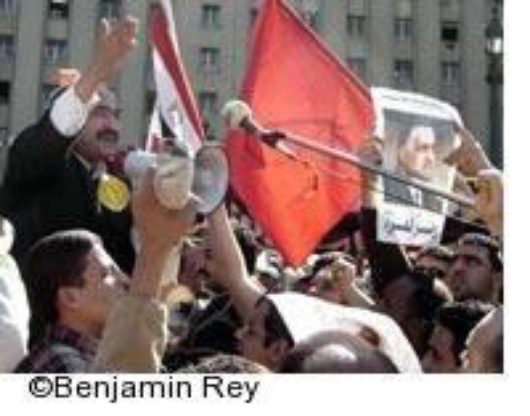Will the Kifaya movement be enough to change Egypt?
Published on
Translation by:
 sophie de'ath lancaster
sophie de'ath lancaster
Radical, youthful, colourful and symbolic: the new style of the Egyptian opposition echoes that of the Ukrainian ‘Orange Revolution’. However, its success seems less certain
 On the stage in the Conference Hall of the Journalist’s union, Abdel-Halim Qandil takes the stand amid rapturous applause. It is Monday afternoon, March 14th, and the Egyptian Movement for Change has organised a press conference in front of some 200 people. Qandil is the spokesperson for the movement, but he is also the editor of a weekly Nasserian paper, Al-Arabi, known for its outspokenness. It was clearly this outspokenness which, last October, resulted in him being attacked and left naked on the road to Suez by unknown assailants. But this episode does not seem to have intimidated him. “Mubarak [the Egyptian President] has made a mistake if he thinks he can insult the intelligence of Egyptians”, he cries between two rounds of applause. “We must get rid of the people who govern us!” In response, the public chant: “Vive Kifaya! Mubarak out, we’ve had enough!”
On the stage in the Conference Hall of the Journalist’s union, Abdel-Halim Qandil takes the stand amid rapturous applause. It is Monday afternoon, March 14th, and the Egyptian Movement for Change has organised a press conference in front of some 200 people. Qandil is the spokesperson for the movement, but he is also the editor of a weekly Nasserian paper, Al-Arabi, known for its outspokenness. It was clearly this outspokenness which, last October, resulted in him being attacked and left naked on the road to Suez by unknown assailants. But this episode does not seem to have intimidated him. “Mubarak [the Egyptian President] has made a mistake if he thinks he can insult the intelligence of Egyptians”, he cries between two rounds of applause. “We must get rid of the people who govern us!” In response, the public chant: “Vive Kifaya! Mubarak out, we’ve had enough!”
Mubarak: father and son
Kifaya (Arabic for ‘enough’), the emblematic slogan written on a yellow background on banners and stickers, is the name now used by the movement. Formed during the 2003 protests against the war in Iraq, Kifaya is made up of citizens, politically engaged activists, Liberals and members of the Left, Nasserians, modern Muslims, and even some political parties. Their first public meeting on December 12th 2004 broke a taboo: for the first time, a demonstration directly targeted the Head of State himself, and his son.
The issue of inherited power, as was the case in the Syrian Republic, is shaping Egyptian political debate. Gamal, President Mubarak’s son, is becoming increasingly present in political life. Today, along with the “young guard” of businessmen that surrounds him, he is one of the most influential executives of the ruling National Democratic Party (NDP). During the past few months, the opposition parties have thus centred their campaign on reforming the Constitution to avoid a repeat of the situation whereby Hosni Mubarak, or his chosen substitute, is the only presidential candidate put forward for elections.
Opposition young and old
The scope of the legal opposition parties (that is to say, those that are authorised by the government) is marked by ambiguities. Divided in their ranks, these parties must find the balance between the constraints placed upon them: they must play their part as the opposition, but without challenging the system that gives them a voice. Also, the recent ‘national dialogue’ between the NDP and these parties has resulted in these groups gradually going back on their demands. The majority, while continuing to talk about Constitutional reform, have accepted that its implementation should be postponed until after the next elections. It is in reaction to this control of the ‘official’ political scene by the regime that a less formal, less institutionalised, less dependent opposition has developed in the form of Kifaya. It is not surprising to find that amongst the founders of the Kifaya movement, there are executives from newer parties hoping for official recognition.
Pressure from America, the skill of the regime, silence on the street
Victory? When, on February 26th, the President suddenly decided that more than one candidate will be put forward for the presidential elections at the end of this year, it was like a bomb going off. That day, Hosni Mubarak announced that constitutional reform would be implemented in order to establish multiparty presidential elections via universal suffrage. Thus, the president of the Republic pulled the rug out from under the opposition’s feet by removing their main demand. But in reality things will not change as this announcement does not challenge the main mechanisms that block all possibility of a genuine alternative. Emergency law, which is used to ban or control public gatherings, the control of political parties, even censorship of the press, all these things are to remain.
The press conference held by Kifaya responded to this ‘fake reform’. Amongst the speakers who followed one another on the stage, one cited “exterior pressures” which resulted in only a “reformulation of the dictatorship”. This meddling foreigner is the shadow that hangs over all of these debates. Undoubtedly, many believe that pressure, in particular from America, has played a role in these latest developments. They have also produced an opportunity for protest, putting Hosni Mubarak in an awkward position. However, this subject has also become a rhetorical argument used to denounce an opposition which is ‘allied to a foreign power’ and to postpone these ‘exogenous’ reforms. This is another obstacle for a movement which has found it difficult to mobilise the people. The leaders of the regime, on the other hand, have always had many means to control the political game: Egyptian authoritarianism will be around for a long time yet.
Translated from Le mouvement « Kefaya » suffira-t-il à changer l'Egypte ?


